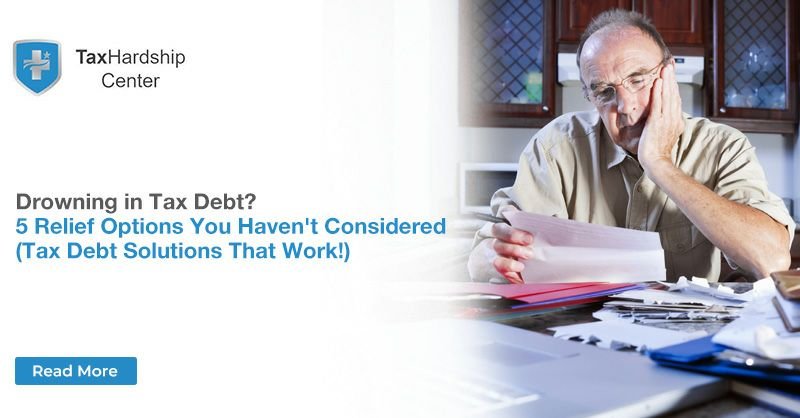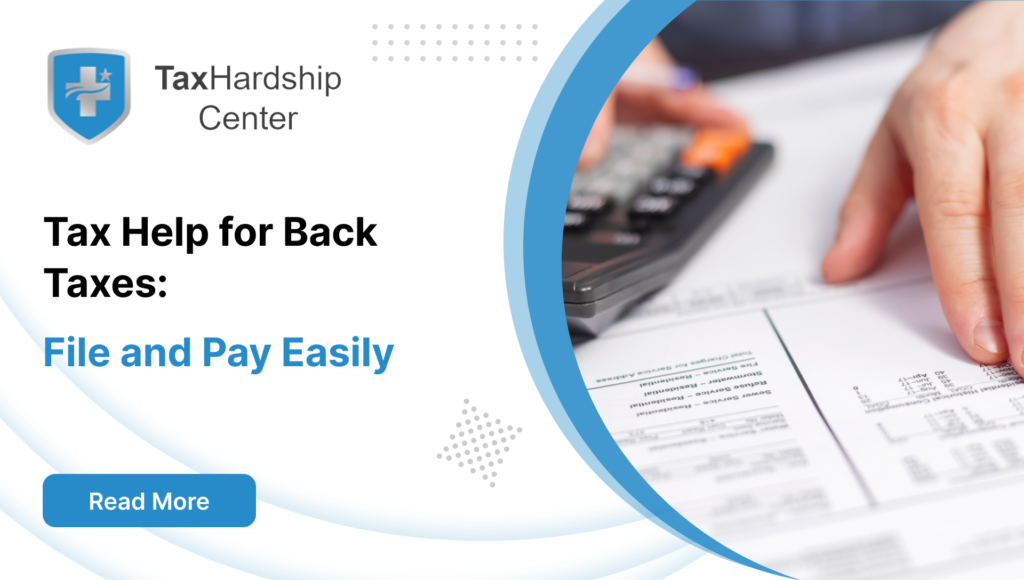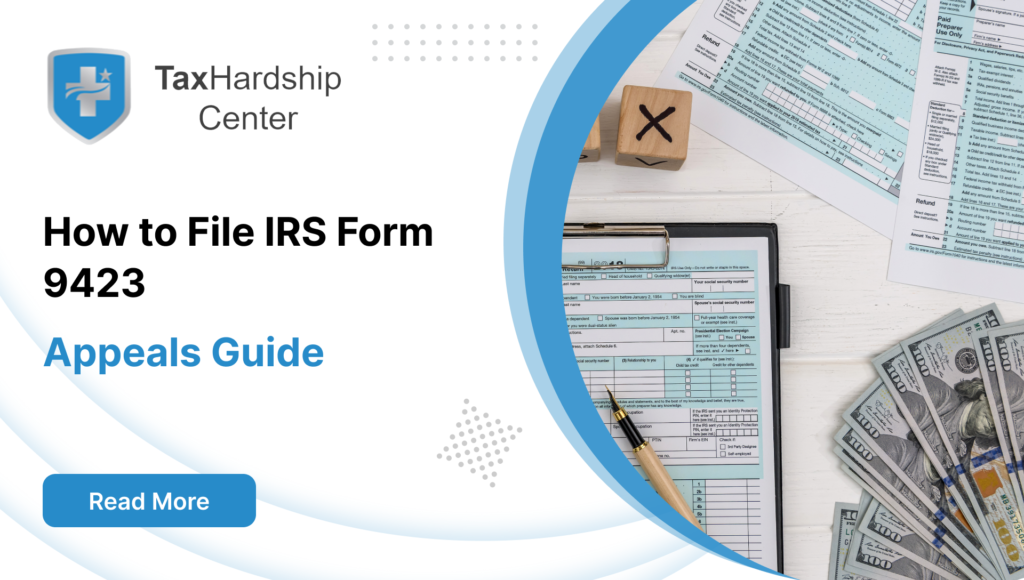Dealing with tax debt can feel like navigating treacherous waters with the weight of financial uncertainty pulling you under. However, beyond the commonly known solutions, such as installment agreements or offers in compromise, several other relief options may have yet to cross your radar. Whether you’re an individual taxpayer or a business owner, exploring all possible avenues to manage and resolve your tax debts effectively is crucial. Here, we delve into five alternative tax debt solutions that work, discussing their benefits, potential trade-offs, and the challenges you might face.
Are Tax Debts Weighing You Down? Let’s Explore Your Options Together.
The Tax Hardship Center provides a lifeline to those submerged by tax obligations. Our mission is to offer a hand to hold as you seek resolution and peace of mind. With our 14-day money-back guarantee, you can confidently engage our services, knowing that we prioritize your satisfaction and financial well-being.
- Money-Back Assurance: Our 14-day money-back guarantee means you can trust in the value of our service.
- Personalized Support: Each case is unique, and we’re committed to finding a bespoke solution for you.
- Empathy and Expertise: We combine our tax expertise with a genuine understanding of the emotional toll of tax debt.
If you’re questioning whether tax relief is within reach, why not allow us to support you? Our promise: no high-pressure tactics, just honest assistance. Contact the Tax Hardship Center today for a discussion that could change your financial future.
Currently Not Collectible Status
When you’re drowning in tax debt, having the Internal Revenue Service (IRS) temporarily halt collection efforts can provide much-needed breathing room. If you can prove to the IRS that your expenses outweigh your income, you may qualify for Currently Not Collectible (CNC) status. This option suspends collection activities, such as wage garnishments or bank levies, giving you the time to improve your financial situation. However, interest and penalties continue to accrue, which means the amount you owe could grow over time.
Eligibility and Relevant Information:
- Proof of Financial Hardship: Provide documentation showing that your monthly income is less than or equal to your allowable monthly living expenses.
- Suspension of Collections: The IRS will not pursue collection actions, including levies or garnishments.
- Accrued Penalties and Interest: Interest and penalties will still accumulate on the unpaid balance.
- Temporary Relief: CNC status is not permanent, and the IRS periodically reviews your financial situation to determine if you can start paying.
Partial Payment Installment Agreements (PPIAs)
PPIAs are a less commonly utilized strategy where you agree to pay off your tax debt in smaller, more manageable amounts over time. Unlike the standard installment agreement, a PPIA considers your ability to pay and may result in a portion of the debt being forgiven after the expiration of the collection statute. The trade-off here is the requirement of periodic financial reviews by the IRS, ensuring that your payment plan remains based on your current ability to pay.
Eligibility and Relevant Information:
- Financial Analysis: Submit detailed financial statements to the IRS to determine your ability to pay.
- Long-Term Payment Plan: Agree to a long-term payment plan that is usually reviewed every two years.
- Forgiveness Opportunity: Part of your tax debt may be forgiven over time.
- Compliance: Must comply with all filing and payment obligations during the agreement.
Taxpayer Advocate Service (TAS)
If you’re facing significant hardships due to your tax debt and feel like you’ve hit a wall with the IRS, reaching out to the Taxpayer Advocate Service may be beneficial. As an independent organization within the IRS, the TAS helps individuals resolve tax problems that haven’t been fixed through normal channels. While the TAS is a valuable resource, remember that it’s generally reserved for individuals grappling with immediate and significant hardship.
Eligibility and Relevant Information:
- Significant Hardship: Experience substantial financial or otherwise hardship because of the IRS’s actions.
- IRS Dead Ends: This shows that traditional IRS channels have not resolved the issue.
- Personalized Assistance: Access a dedicated advocate to help navigate your case through the IRS.
- Free Service: TAS is a free service provided by the government.
Innocent Spouse Relief
You may qualify for Innocent Spouse Relief if your spouse or former spouse failed to report income, reported income improperly, or claimed improper deductions or credits. This solution could absolve you from responsibility for paying tax, interest, and penalties if your spouse or ex-spouse engaged in tax misbehavior without your knowledge. However, proving your innocence can be complex and requires substantial documentation and legal assistance.
Eligibility and Relevant Information:
- Joint Tax Return: Filed a joint tax return that has understated tax.
- Lack of Knowledge: Establish that you were unaware of the errors leading to the understated tax.
- Timely Filing: Innocent spouse relief must be requested within a specific timeframe from the IRS’s first attempt to collect the tax.
- Fairness Consideration: Convincing the IRS that holding you responsible for the tax debt would be unfair.
Bankruptcy
Contrary to popular belief, some tax debts can be discharged through bankruptcy. However, this is contingent on several factors, including the tax type, the debt age, and whether you’ve filed a tax return. Two kinds of bankruptcy may discharge tax debts: Chapter 7 and Chapter 13. Chapter 7 helps eliminate certain debts, while Chapter 13 involves a payment plan. Opting for bankruptcy can have profound implications for your credit score and is typically seen as a last resort.
Eligibility and Relevant Information:
- Type of Tax Debt: Most income taxes in Chapter 7 and some property taxes in Chapter 13 may be discharged.
- Age of Tax Debt: Generally, tax debts are dischargeable if they are at least three years old.
- Tax Filings: You must have filed valid tax returns for the years in question at least two years before filing for bankruptcy.
- Consideration of Fraud: Tax debts related to fraud or willful evasion are not eligible for discharge.
- Long-Term Consequences: Bankruptcy can significantly impact your credit score and financial stability.
Each option has challenges, such as satisfying strict IRS criteria, enduring lengthy procedures, or dealing with potential long-term financial impacts. It’s crucial to weigh the immediate benefits of these solutions against their future consequences, especially considering the compounding nature of tax penalties and interest.
Before making any decisions about resolving tax debt, it’s advisable to consult with a tax professional or attorney who can help navigate the intricate requirements and suggest a course of action tailored to your specific circumstances. They can also provide representation in dealings with the IRS, potentially leading to more favorable terms.
Seeking Clarity on Your Tax Debt Relief Options?
At Tax Hardship Center, we understand the stress and uncertainty of tax debt. Our seasoned tax professionals are prepared to dive deep into your unique situation, offering a comprehensive expert review of your tax problems at no cost. If you’re unsure about what steps to take next, our free consultation can shed light on potential solutions you may have overlooked.
- Objective Assessment: Receive an unbiased evaluation of your tax debt situation.
- Expertise at No Initial Cost: Benefit from expert advice without the upfront financial commitment.
- Discover New Strategies: Learn about lesser-known tax relief options tailored to your needs.
Ready to reclaim control over your financial life? Contact us today for your free consultation and let our experts help you chart a course toward tax debt relief.
In conclusion, while tax debt can be overwhelming, several less-known relief options might provide a lifeline. With careful consideration and professional guidance, you can make informed decisions that alleviate the burden of tax debt, allowing you to regain financial stability and peace of mind.
Frequently Asked Questions
1) What are my options if I can’t afford to pay my tax debt in full?
Answer: You have several options if you cannot fully pay your tax debt. These include entering into an Installment Agreement with the IRS, where you can make monthly payments; applying for an Offer in Compromise, which may allow you to settle your debt for less than the total amount owed; seeking Currently Not Collectible status if you’re experiencing financial hardship; or exploring the possibility of discharge through bankruptcy. It’s essential to review each option’s eligibility requirements and consult with a tax professional to determine the best course of action for your situation.
2) Can tax debt be forgiven or reduced?
Answer: Yes, in some cases, tax debt can be forgiven or reduced. The IRS may offer an Offer in Compromise (OIC) to qualified individuals who can demonstrate that they cannot pay the total amount due to financial hardship, doubt about liability, or if it would promote effective tax administration. The process requires a thorough review and potentially a compromise by the IRS. Only some qualify for an OIC, so seeking expert advice or an expert review of your financial circumstances is advisable.
3) How does a Partial Payment Installment Agreement (PPIA) differ from a regular One?
Answer: A Partial Payment Installment Agreement (PPIA) differs from a regular Installment Agreement in that it allows taxpayers to make monthly payments towards their tax debt that may be less than the total amount owed. With a regular Installment Agreement, you agree to pay the entire debt over time. However, with a PPIA, if you can demonstrate financial hardship, the IRS may agree to accept smaller payments over a specified period. Any remaining tax debt may be forgiven at the end of this period. Financial status is typically reviewed every two years, and you must remain compliant with tax laws during the agreement.
4) What is the Taxpayer Advocate Service, and how can it help me with my tax debt?
Answer: The Taxpayer Advocate Service (TAS) is an independent organization within the IRS that assists taxpayers facing significant hardships that need to be resolved through normal IRS channels. TAS can help expedite resolutions, offer guidance on complex tax issues, and even represent taxpayers before the IRS. This service is free and can serve as a valuable resource, especially if you’re dealing with a tax problem affecting your financial well-being and where timely resolution is critical.
5) Is it true that bankruptcy can clear my tax debt? If so, under what conditions?
Answer: Bankruptcy can sometimes clear certain tax debts under specific conditions. Generally, income tax debts may be dischargeable in a Chapter 7 bankruptcy if they are for a tax period at least three years old at the time of filing and were assessed by the IRS at least 240 days before filing for bankruptcy. The taxpayer must also have filed a tax return for the debt in question at least two years before filing for bankruptcy. Tax debts related to fraud or willful evasion are not dischargeable. It’s critical to consult with a tax attorney or bankruptcy expert to review your unique situation and determine if this option is viable for you.








